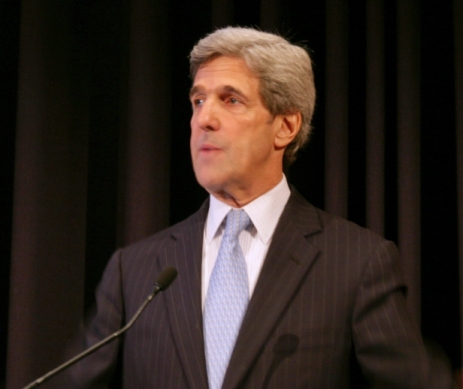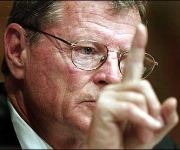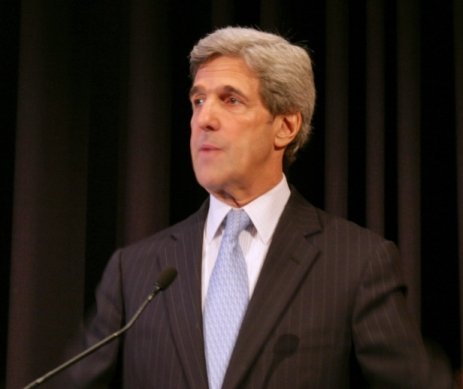COPENHAGEN — As climate negotiators hash out the eleventh-hour details of an operational accord, one question looms over the discussions: Is a weak deal better than no deal at all?
I put that question and others to Sen. John Kerry (D-Mass.) in a sit-down interview yesterday. The chair of the Senate Foreign Relations Committee admitted that all bets are off on a getting climate bill out of the U.S. Senate if we can’t reach some kind of agreement in Copenhagen. “No deal at all would kill an effort in the Senate,” said Kerry.
Here’s a video excerpt from the interview. Scroll below the video to read what else Kerry had to say about the Senate, Copenhagen and why he’s fighting so hard for a climate accord.
Q. You’ve been through so many climate deliberations. How is this different and what does it feel like to be here?
A. This is a little bit slower and behind where they normally are at this point in time. But I think tonight things are going to start to come together. I think there’s going to be progress. I’m very very hopeful and being positive.
Q. The Senate is getting a big rap for being an obstacle to progress here. Do you deserve that criticism?
A. I think the senate had some very real concerns several years ago. Requiring a certain number of countries to reduce emissions while other countries would be outside of the agreement. In fact, today here in Copenhagen, we are all discussing the part of the agreement and that’s a big shift. And it’s a very important one, and hopefully if they come to an agreement in Copenhagen it can have an important impact on the attitude of the Senate.
Q. Can you elaborate on that? How can it help or hurt the progress on Senate legislation this spring?
A. It can help enormously because a lot of senators appropriately are worried that if we require [emissions] reductions in America, what happens if China, India, and other countries just fill them up with their own replacement emissions? People want to know that if we’re going to do this, other people are doing it too. Everybody has to be part of the solution. And that’s a real shift in thinking. I think people realize the science is moving very rapidly. While it would have been better to have begun this eight, 10 years ago, 17 years ago, we are where we are. And now everybody has got to be part of the solution.
Q. Wasn’t it true that in Kyoto, the president was one step ahead, or several steps ahead of Congress and that hurt the situation rather than helped it? Do you think it polarized Congress?
A. Not if it’s done correctly. If there is an agreement here and it doesn’t have adequate sharing of information, measurement, what people are doing, verification, it would be a non starter. If people come out of Copenhagen and there’s a realistic verification measurement and everybody is joining in on this effort in realistic ways according to their abilities, I think that will encourage people to have a more open mind about how we are going to proceed forward.
 Photo: Cliff1066 via Flickr Creative Commons Q. Will a weak deal be worse than no deal at all?
Photo: Cliff1066 via Flickr Creative Commons Q. Will a weak deal be worse than no deal at all?
A. Boy, that’s a tough question. I guess it would depend on what [the deal] looks like. No deal at all would kill an effort in the Senate. It would be very, very difficult to move forward in the United States Senate if people here can’t agree on being part of something.
Q. Define the terms of what would be a decent agreement.
A.  Well, if people have come together agreeing to specific reductions in their emissions; agreeing to an exchange of information and cooperative effort where we can measure what people are doing in a real way; where there is an adequate sharing of cost and finance mechanism for some of the less developed countries that have great difficulties doing things without help; and where there is a forestation component, where we are helping preserve forests and minimize the degradation of forests; and then a time to meet again to finish this up. Those would be, that would be a big deal. I think if we get that, that would be great.
Well, if people have come together agreeing to specific reductions in their emissions; agreeing to an exchange of information and cooperative effort where we can measure what people are doing in a real way; where there is an adequate sharing of cost and finance mechanism for some of the less developed countries that have great difficulties doing things without help; and where there is a forestation component, where we are helping preserve forests and minimize the degradation of forests; and then a time to meet again to finish this up. Those would be, that would be a big deal. I think if we get that, that would be great.
Q. Al Gore called for an April 22, 2010 deadline for the Senate. Is that viable?
A. It’s possible. You know the majority leader has already said that he hopes to bring this to the Senate floor in the early spring and that would fit in the schedule. But you know you can’t get specific. You just got to have a target for time, and we’re going to do the best we can to try to get this done.
Q. Is it fair to characterize this process as possibly the single most important act of diplomacy of the century?
A. Well, so far it’s a young century. In the nine years we’ve had, yeah it probably is.
Q. How much should rich countries be paying poor countries to adapt to and mitigate climate change, and how should that transfer of funds be structured?
A. I don’t think it’s a question just of rich countries paying poor countries. It’s a question of what kinds of development bank, what kinds of structures are going to be created within the carbon trading system center to provide some revenues. It doesn’t have to come out of the budget of the country. There will be a lot of private sector money that’s going to be going into this for investment purposes. So we shouldn’t look at this as just spending the money of the budget. This is a whole financing mechanism that’s much bigger, more complicated than that. But I think there will be a need to provide assistance to very poor countries where we don’t want them building a coal fired power plant but that’s their only option. We need to help move them into new technologies in new ways.
Q. And that’s a very exciting proposition. This idea that we can pour money into the development of clean economies all over the world and profit from it, benefit from it.
A. Well, it’s important but we benefit too. And frankly, we’ll create jobs in the United States. Because if our companies are able to sell the technologies, we’re involved in helping some of those countries move to cleaner, more efficient fuels, we can create good jobs in America.
Q. Last question: What does this mean to you personally? You’ve put a lot on the line, a lot of political capital to fight for legislation in the Senate against all odds. Why are you fighting so hard?
A. I’m fighting so hard because this is literally about survival of the planet and life on the planet. People shouldn’t take this lightly. When scientists tell us that if the earth’s temperature warms more than two degrees C, it will be catastrophic, you better listen to them. And every bit of evidence that they have predicted would happen has happened. So you’ve got to take this seriously. I do. I think as a public official, if Dick Cheney can say we should go to war on a one percent chance that a terrorist might attack you, then when you have a near 100 percent chance that you’re going to have disastrous consequences from climate, we ought to go to the moral equivalent of war and do something about it. And that’s why I’m in this: I think its about life and about saving lives. It’s about preventing the spread of disease. It’s about preventing the destruction of natural resources. It’s about providing jobs to people. It’s about better health. It’s about America’s energy independence. You can run down a long list of things that are at stake here. I don’t think the stakes get much bigger than that.
Spread the news on what the føck is going on in Copenhagen with friends via email, Facebook, Twitter, or smoke signals.




